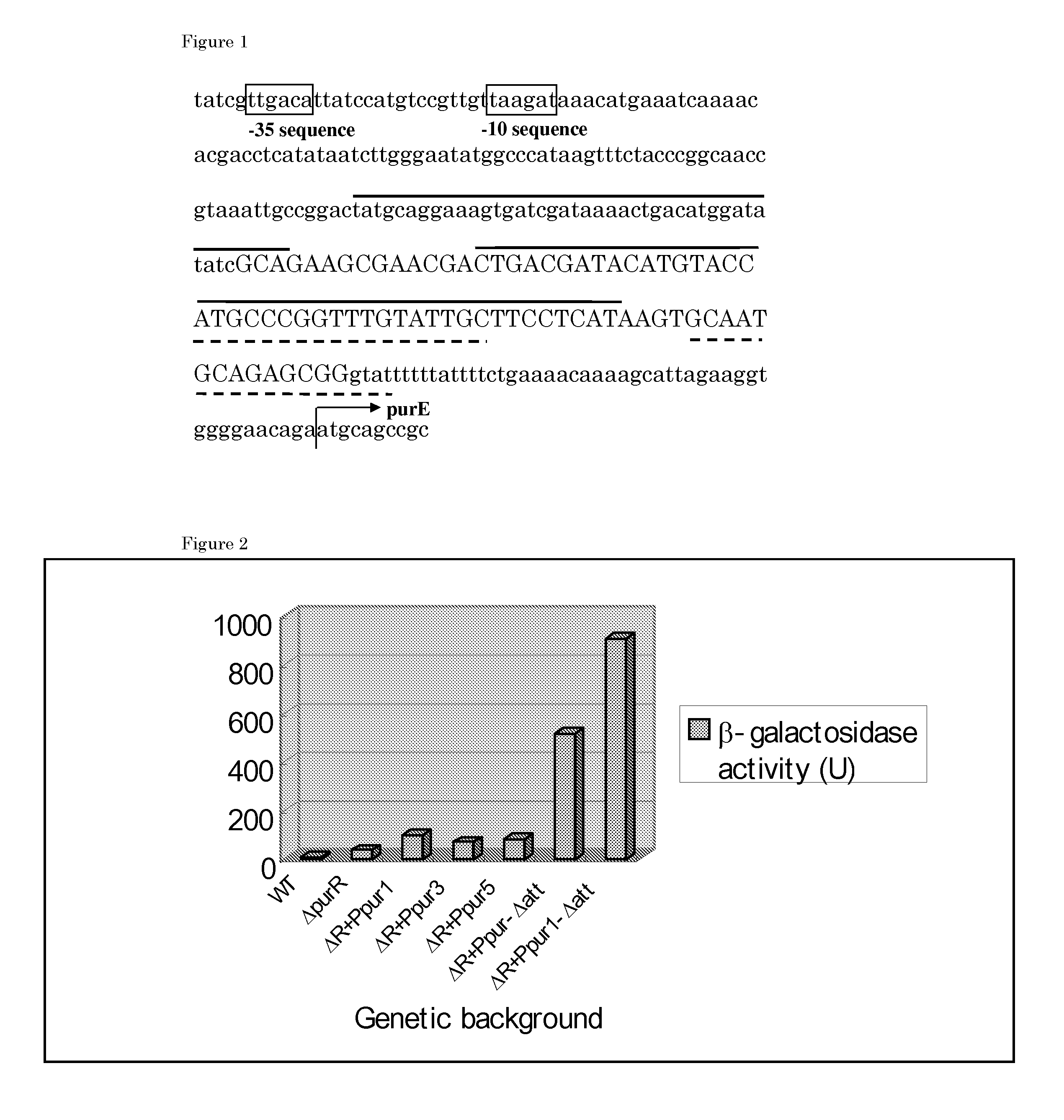Purine-derived substance-producing bacterium and a method for producing purine-derived substance
a technology of purine-derived substances and bacterium, which is applied in the field of bacillus bacterium, can solve the problems of bacteria which produces purine-derived substances, and achieve the effect of efficient production of purine-derived substances
- Summary
- Abstract
- Description
- Claims
- Application Information
AI Technical Summary
Benefits of technology
Problems solved by technology
Method used
Image
Examples
example 1
[0128]
[0129](1) Construction of a Purine Nucleoside Phosphorylase (pupG)-Disrupted Strain
[0130]A disrupted-type pupG gene was introduced into a recombinant KMBS16 strain (2004-0166575A) which is derived from Bacillus subtilis (B. subtilis 168 Marburg strain; ATCC6051) and in which the purine operon repressor gene (purR), succinyl-AMP synthase gene (purA), and purine nucleoside phosphorylase gene (deoD) are disrupted, as follows.
[0131](i) Cloning of the 5′-End Region of the pupG Gene
[0132]Based on the information from GenBank (Accession No. NC—000964), the primers having the following nucleotide sequence were designed for PCR:
[0133]ATTGCACGGCCGTTCGTCGG (SEQ ID NO: 1)
[0134]cgcagatctCCGGATTTTCGATTTCGTCC (SEQ ID NO: 2; The nucleotide sequence indicated by lower case letters is a tag containing a BglII site.)
[0135]Using a chromosomal DNA from B. subtilis 168 Marburg strain as a template and the above-described primers, PCR was conducted (94° C., 30 seconds; 55° C., 1 minute; 72° C., 2 mi...
example 2
[0159](1) Introduction of a Mutant guaB Gene
[0160]A guaB (A1) mutation which results in replacement of the Alanine at position 226 in SEQ ID NO: 62 with Valine in the IMP dehydrogenase gene (guaB) was introduced into a recombinant KMBS113 strain that was derived from Bacillus subtilis (B. subtilis strain 168 Marburg; ATCC6051) and in which the purine operon repressor gene (purR), succinyl-AMP synthase gene (purA), and purine nucleosidase phosphorylase gene (pupG) had been disrupted, as follows. The introduction of the guaB(A1) mutation causes a reduction in the enzyme activity of IMP dehydrogenase.
[0161](i) Preparation of a Bacterial Strain in Which a Kanamycin-Resistance Gene was Inserted into the Middle of the Wild-Type guaB Gene Derived from B. subtilis Strain 168 Marburg Strain
[0162]In amplification of the upstream region of the guaB gene, PCR primers having the nucleotide sequences shown below were designed based on GenBank information (Accession No. NC—000964 and V01547):
[0163...
example 3
[0195]
[0196](1) Preparation of Ppur-Disrupted Strain
[0197]A strain derived from Bacillus subtilis (B. subtilis 168 Marburg strain; ATCC6051) and in which purine operon promoter (Ppur) was disrupted was prepared as follows.
[0198](i) Amplification of the Upstream Region of the Ppur by PCR
[0199]Based on the information from GenBank (Accession No. NC—000964 and V01277), PCR primers having the following nucleotide sequence were prepared:
[0200]cgcggatccTTATTTAGCGGCCGGCATCAGTACG (SEQ ID NO: 17; the nucleotide sequence indicated by lower-case letters is a tag containing a BamHI site);
[0201]cgtttgttgaactaatgggtgctttATGGATAATGTCAACGATATTATCG (SEQ ID NO: 18: the nucleotides indicated by lower-case letters is the sequence of upstream of the promoter of the chloramphenicol-resistance gene (cat) that is cloned into pC194).
[0202]PCR was conducted (94° C., 30 seconds; 55° C., 1 minute; 72° C., 1 minute; 30 cycles; Gene Amp PCR System Model 9600 (Perkins Elmer)) using the above-described primers and...
PUM
| Property | Measurement | Unit |
|---|---|---|
| pH | aaaaa | aaaaa |
| temperature | aaaaa | aaaaa |
| pH | aaaaa | aaaaa |
Abstract
Description
Claims
Application Information
 Login to View More
Login to View More - R&D
- Intellectual Property
- Life Sciences
- Materials
- Tech Scout
- Unparalleled Data Quality
- Higher Quality Content
- 60% Fewer Hallucinations
Browse by: Latest US Patents, China's latest patents, Technical Efficacy Thesaurus, Application Domain, Technology Topic, Popular Technical Reports.
© 2025 PatSnap. All rights reserved.Legal|Privacy policy|Modern Slavery Act Transparency Statement|Sitemap|About US| Contact US: help@patsnap.com

